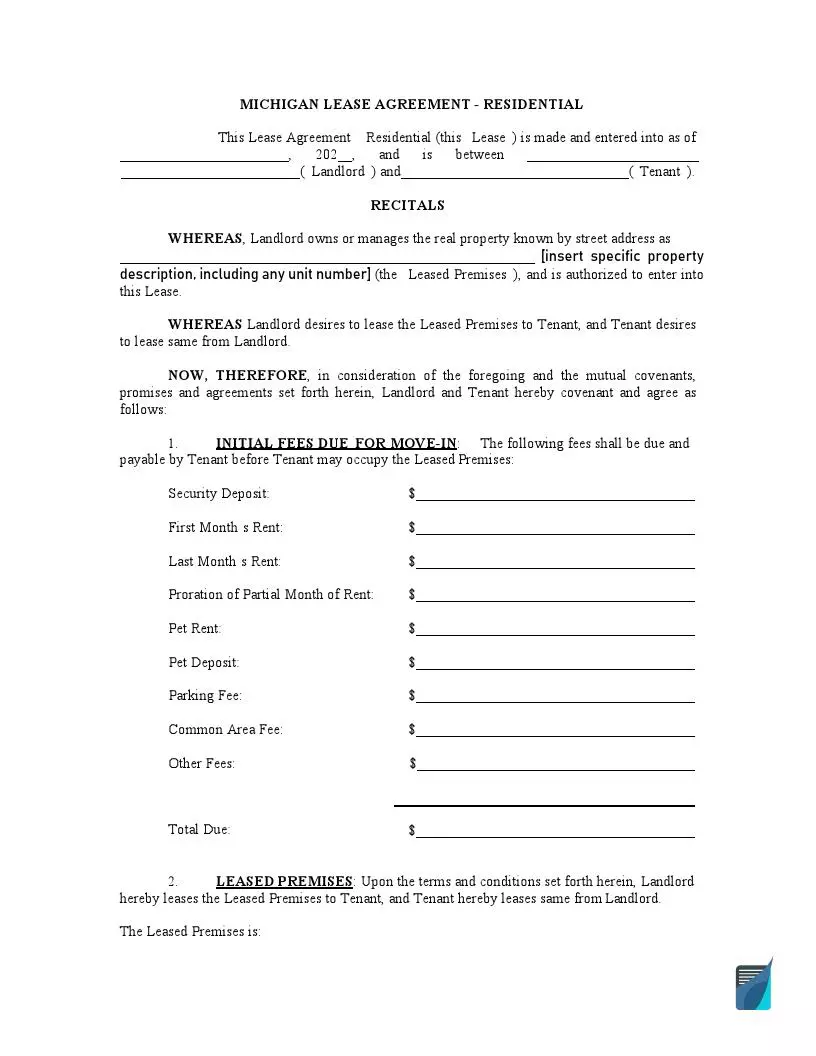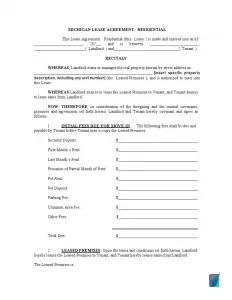Michigan Rental Lease Agreement Forms
In the U.S., including Michigan, a rental agreement is a widely used document. It is a legally-binding form that is created by two parties, one of which is renting out a certain space (either for residential or commercial purposes) to another individual. Usually, the parties are referred to as the “landlord” and the “tenant.” The paper serves several purposes. First of all, it outlines the responsibilities of the involved parties. Secondly, it protects the owner’s rights in case of unpredictable circumstances caused by the tenants. Even if you lease a room to a reliable friend or relative, it is recommended to conclude such a contract to avoid confusing situations and disputes.
The structure of the form and requirements for its completion may vary from state to state. However, this type of form covers nearly the same information in all states: personal details of the parties, description of the property and its address, the rent amount, and other terms and conditions under which the parties cooperate.

Build Your Document
Answer a few simple questions to make your document in minutes
Save and Print
Save progress and finish on any device, download and print anytime
Sign and Use
Your valid, lawyer-approved document is ready
In Michigan, both parties can enter into various types of rental agreements depending on the type of rental deal at hand. They can choose from at least seven different forms:
- Month-to-Month Rental Contract;
- Standard Rental Agreement;
- Commercial Lease Agreement;
- Rent-to-Own Rental Contract;
- Room Rental Agreement;
- Letter of Lease Termination;
- Sublease Agreement.
Some of the forms differ in the period of time for which the premises are rented out. Others are meant only for tenants (for instance, if a tenant wants to lease a room when they are renting the property from another owner). To get acquainted with all specific terms of each form or to create one of them, you are welcome to make use of our form-building software that will also help to make the downloading process quicker.
Michigan Laws and Lease Requirements
Before you conclude a rental contract, you should find out what requirements and rules regulate the relations between you and the other party. Keep in mind that these rules vary from state to state. In Michigan, the majority of laws regarding renting are stated in Chapter 554 of the state law or in special state guides that reveal a tenant’s rights and duties.
Requirements Regarding Security Deposit
A security deposit is an amount of money that a tenant is to provide to a landlord. The landlord, in their turn, must deposit this sum of money into a bank account and inform the tenant where the bank is located and provide them with the account number.
According to Section 554.602, the maximum amount of the security deposit must not exceed the rent for one month and a half. A security deposit ensures that the tenant can pay the rent and financially cover all damages caused.
As stated in the above-mentioned section, if the renter has decided to move out and has not broken the rental contract, the security deposit must be returned within 30 calendar days. The landlord can use the money only if they need it to repair the damage caused by the renter.
The amount of interest to which the tenant is entitled depends on the type of bank account. An interest-bearing account may require an interest that is less than 5%.
Owner Right of Entry
Any tenant has a right to privacy when they make a rental deal and move into a certain property. Nevertheless, if any maintenance is needed, the landlord has a right to enter their property. In most states, the owner must inform the tenant no later than one-two days before coming. In Michigan, if the owners want to access the rental unit for repair or other purposes, they are not required to notify the lessee. Although notifying the tenant is optional, it is recommended to give a phone call or write an email and state an adequate reason for the visit.
Required Disclosures
In Michigan, a rental deal is never made without providing several disclosures. Thus, when creating a lease agreement, make sure that you have prepared the following disclosures:
- Rental Inspection Checklist. This checklist includes items located on the premises. The landlord must indicate if these items have sustained any damage from the tenant and the condition in which they were before the tenant moved in. This disclosure must be provided to the renter within seven days from the beginning of the tenancy.
- Lead-Based Paint. As a rule, this disclosure is required if the house was constructed before 1978. It is mandatory in the majority of U.S. states.
- Security Deposit Notice. The landlord must give a receipt to the renter to provide the information about the location of the bank, the amount of deposit made by the renter, and the bank account number within 30 days since the beginning of the residency.
- Domestic Violence Victims. When concluding a contract, the landlord is required to attach a disclosure covering issues of domestic abuse or sexual assault. According to the notice, a tenant can be liberated from paying the rent if an incident giving rise to reasonable apprehension has happened.
- Notices Disclosure. As there are some situations when parties need to exchange notifications via email, both the landlord and the renter have to provide their valid email addresses.
- Truth in Lending Act. The notice gives information about the legal right of the parties if some of the responsibilities haven’t been carried out or some of the rights have been abused.
Michigan Rental Lease Agreement Form Details
| Document Name | Michigan Rental Lease Agreement Form |
| Other Names | MI Rental Lease, Michigan Residential Lease Agreement |
| Relevant Laws | Michigan Compiled Laws, Chapter 554 |
| Security Deposit Amount | One and a half months’ rent |
| Security Deposit Return | Thirty (30) days from end of occupancy |
| Avg. Time to Fill Out | 18 minutes |
| # of Fillable Fields | 119 |
| Available Formats | Adobe PDF |


Some other essential Michigan forms readily available for download here and that can be personalized in our simple document maker.
Other Rental Lease Agreement Forms by State
